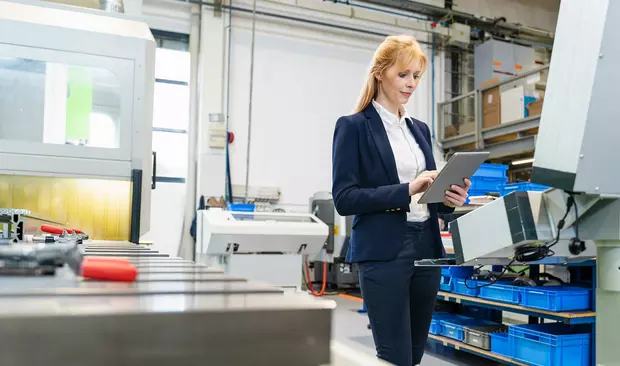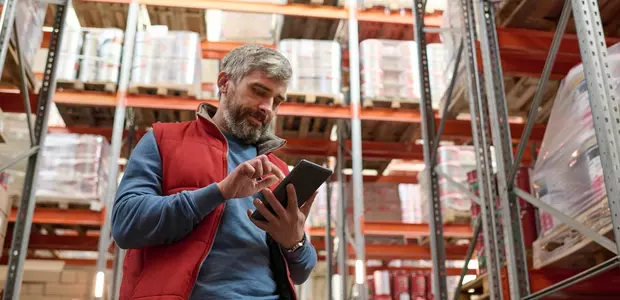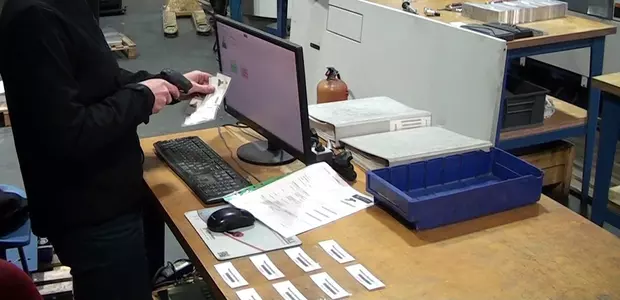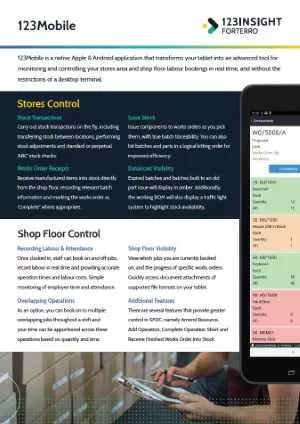How mobile devices can help feed your business intelligence

The humble PC has been commonplace throughout businesses since the 1980’s, and while there are benefits to a large screen and a certain amount of horsepower under the lid, there is no longer a need for them to take up space on the shop floor or in your stores department. Although Windows-based tablet PCs have been around for 20+ years, it wasn’t until Apple and Android-powered devices rise became ubiquitous that it now makes sense for these sleek devices to replace their overweight desktop counterparts. In this blog we explain why tablets on the shop floor not only streamline day-to-day tasks, but also how they can help you to make long-term decisions for your business due to the business intelligence data that they help to collect more effectively.
Tablets versus PCs - Comparing the physical hardware
The smaller form factor of a tablet means that you don’t require dedicated space for a screen, keyboard and mouse, or a power source nearby. Many people are also more comfortable with using software on a tablet than a PC, as the perception is that it will be less complicated – ‘it only needs one finger’.
There’s a significant saving to be had around power consumption as well. Tablets tend to have around 10 hours of battery life, which could easily equate to several days of usage. The average low-end 140W PC will cost around £145 per year to run (based on 8 hours per day, 5 days a week). If you were charging a tablet, you can expect that to drop to comfortably under £5 per year!

A tablet wirelessly provides information and functionality, wherever the user needs to be.

A desktop PC requires the user (or users) to travel to it to perform tasks such as scanning barcodes.
Moving from a PC which will usually have a screen of 20”+ to a tablet that will of around 10” means that you may have to make some compromises. This will usually either mean that less important data is tucked away, or you’ll have to do a little more scrolling.
Given that lower-end Android tablets can be picked up for around £100-£150 in comparison to a PC costing several times more, this can also deliver a significant saving. CPU power generally isn’t a consideration, as the client device is simply receiving and displaying data – all the ‘heavy lifting’ is done on your server.
From the 123Insight perspective, there is also a cost saving on 123Mobile licences versus full desktop licences, allowing data and functionality to be placed directly into the hands of more users.
Add the electricity savings to the savings made from lower cost devices, and then multiply that by the number of devices you’ll need, and you can start to see the savings you might make – and that’s before you start to factor in the time savings. Read on!
Real time inventory management
A tablet makes much more sense in the stock room than a tethered PC. Staff can easily walk around the stock room, tablet in hand, and perform common tasks such as issuing stock, and carrying out stock transactions such as transferring between locations, adjustments, or perpetual ‘ABC’ stock checks. Barcodes can be scanned using the onboard tablet camera, rather than perhaps taking items to a dedicated area to be scanned. Intelligently, staff can be guided to pick from a list in the fastest order, based on where items are physically located. This can drastically reduce the amount of legwork required across the working week.
See ABC stock checking in action
Better control on the shop floor
Often, staff will share a single PC terminal on the shop floor, creating bottlenecks. During the COVID-19 pandemic, this was (and still is!) also a possible means of virus transmission. With their own tablet, staff can start the day by clocking in, and then book on and off jobs in real time, collecting much more accurate operation times than if they have to travel back and forth (and potentially wait) to log data into a shared terminal. Wherever they are, they’ll have instant visibility of works order statuses or access associated document attachments.
Enhancing Business Intelligence
Being able to instantly communicate live status information has an extremely positive knock-on effect to overall business intelligence systems. Every defect reported, inventory update or logged shop floor operation helps to build a rich tapestry of historical information that can benefit multiple departments. Purchasing has live information on material consumption and scrappage, sales can immediately see the status of orders, and all key staff have access to live, trustworthy data.
This not only helps in maintaining accurate historical records but also empowers decision-makers to monitor operations in real time, identify trends quicker, and make data-driven decisions to enhance productivity and efficiency.
Examples of how replacing PCs with tablets can help manufacturing
Here are a couple of examples of how switching to tablets made a significant difference to company’s productivity:
- A rubber mouldings manufacturer replaced all their PCs on the shop floor with low-cost tablets running 123Mobile early in the pandemic. Cheap rugged cases meant that they were protected against the harsh manufacturing environment that usually caused desktop PCs to have a shorter than average lifespan. They reclaimed space in several locations across the shop floor and stock room, provided more space for social distancing and reduced staff movements. A side benefit was visibility of staff still on the premises – the company’s offices are a rabbit warren of corridors, so being able to instantly see if all staff had clocked off for the day was useful for management before locking up.
- A company manufacturing motorised leisure jet boards were ramping up from development to manufacturing. The stores manager cited that setting up the stores would have taken much longer, had it not been for the use of mobile devices. Furthermore, during the product’s manufacturing, testing data is associated with the works order, making that data instantly available to all staff any time in the future.
Summary
Embracing mobile technology in stores and on the shop floor can significantly accelerate your workflow processes, improving the accuracy of collected data – all while reducing overall costs. There’s literally no down side to going mobile.

Our dedicated 123Mobile page includes an in-depth webinar on 123Mobile in action, real-world examples, and our price calculator, letting you see how much you could be saving by adopting 123Mobile.